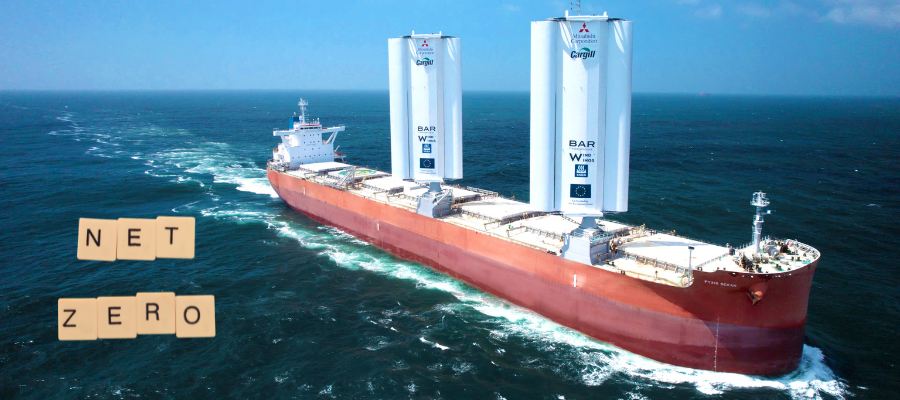🕒 Article read time: 2 minutes
Maritime decarbonisation really starting to make waves

The decarbonisation of global maritime logistics continues at pace, with recent developments accelerating the transition to zero-emission sea freight.
“The government has laid out its ambition to make the UK maritime sector the strongest and most competitive in the world, while transitioning the industry to net zero emissions,” says Ellis Shelton, Policy Advisor at Logistics UK.
“We are seeing innovation across the maritime industry to make this a reality, with two developments catching my eye this week.”
WIND-POWERED CARGO SHIP SETS SAIL
“A cargo ship powered by giant sails has set off on its maidan voyage, in a test to see if wind propulsion technology can be used to achieve efficient, low emission commercial shipping,” says Shelton.
A collaboration between Cargill, BAR Technologies, Mitsubishi Corporation and Yara Marine Technologies, the propulsion – called WindWings – is expected to generate average fuel savings of up to 30 per cent on new build vessels, which could be even higher if used in combination with alternative fuels. There is also an option to retrofit the wings to existing cargo ships.
“The maritime industry is on a journey to decarbonise – it's not an easy one, but it is an exciting one,” said Jan Dieleman, President of Cargill’s Ocean transportation business.
“At Cargill we have a responsibility to pioneer decarbonising solutions across all our supply chains to meet our customers’ needs and the needs of the planet.
“A technology like WindWings doesn’t come without risk, and as an industry leader – in partnership with visionary shipowner Mitsubishi Corporation – we are not afraid to invest, take those risks and be transparent with our learnings to help our partners in maritime transition to a more sustainable future.”
“Logistics UK welcomes innovative solutions to the decarbonisation challenge; we look forward to seeing how wind propulsion technology will play a part in the maritime industry’s net zero future,” concludes Shelton.
BIOFUEL TRIAL ACHIEVES 20% REDUCTION IN EMISSIONS
“We were pleased to see such positive results from a trial conducted by the Global Centre for Maritime Decarbonisation (GCMD) into the use of vegetable oil biofuels to support the decarbonisation of sea shipping,” says Shelton.
“Trials like these illustrate clearly the importance of research and investment into alternative fuels.”
The trial found that net carbon emissions fell by 20% using a vegetable oil biofuel blend, compared with very low sulphur fuel oil (VLSFO), for a dual-fuel liquified petroleum gas (LPG) carrier.
Five supply chain bunkering trials have been carried out by GCMD as part of an $18 million project testing various biofuel blends to reduce carbon emissions.
“Through this pilot, we demonstrated that different tracing techniques can help ensure authenticity and quantity of sustainable biofuels in the supply chain, and using a biofuel blend with LPG can be a feasible pathway for ships to meet the recently revised IMO indicative decarbonisation checkpoint for 2030,” says Dr Sanjay Kuttan, CTO at GCMD.
“Logistics UK is calling for the government to incentivise the adoption of low carbon fuels and to take action to ensure they are cost competitive with diesel and kerosene. We are also urging the government to publish its delayed low carbon fuels strategy,” says Shelton.
“Research commissioned by the government – and wider studies – have demonstrated that there are multiple promising technological routes for achieving zero emission shipping.
“It’s recognised that the diversity of vessels within the sector means a one-size-fits-all solution is impossible,” concludes Shelton.
*www.logistics.org.uk/campaigns
Published On: 24/08/2023 13:00:00

Comments Section
If you are a Logistics UK member login to add comments.